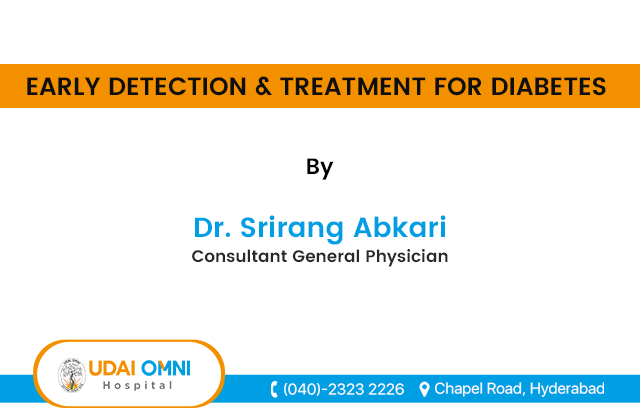Early detection & treatment for Diabetes
Diabetes is a complex, chronic illness which requires continuous medical care with multifactorial risk-reduction strategies beyond glycemic control. Ongoing patient education on self- management and support are critical to preventing acute complications and reducing the risk of long-term complications.
Criteria for the diagnosis of Diabetes:
- Fasting Plasma Glucose ≥126 mg/dL. Fasting is defined as no caloric intake for at least 8 hours.* OR
- 2-h Plasma Glucose ≥200 mg/dL during Oral Glucose Tolerance Test. The test should be performed as described by the WHO, using a glucose load containing the equivalent of 75-g anhydrous glucose dissolved in water.*OR
- Glycosylated hemoglobin HbA1C ≥6.5%.* OR
- In a patient with classic symptoms of hyperglycemia or hyperglycemic crisis, a random plasma glucose ≥200 mg/dL
In the absence of unequivocal hyperglycemia, diagnosis requires two abnormal test results from the same sample or in two separate test samples.
Diabetes can be classified into the following general categories:
- Type 1 diabetes (due to autoimmune β-cell destruction, usually leading to absolute insulin deficiency)
- Type 2 diabetes (due to a progressive loss of β-cell insulin secretion frequently on the background of insulin resistance)
- Gestational diabetes mellitus (GDM) (diabetes diagnosed in the second or third trimester of pregnancy that was not clearly overt diabetes prior to gestation)
- Specific types of diabetes due to other causes, e.g., monogenic diabetes syndromes (such as neonatal diabetes and maturity-onset diabetes of the young [MODY]), diseases of the exocrine pancreas (such as cystic fibrosis and pancreatitis), and drug- or chemical-induced diabetes (such as with steroid use)
If untreated or inadequately treated, it may lead to complications like cardiovascular diseases (heart attack), stroke (cerebrovascular accident), diabetic retinopathy and visual loss, foot ulcers, diabetic neuropathy, diabetic nephropathy with protein loss and chronic kidney disease.
Comprehensive care for a diabetic patient involves control of blood glucose, cholesterol levels, blood pressure, maintenance of ideal body weight and risk assessment for cardiovascular and peripheral vascular diseases. Regular eye check-up, foot care, self-monitoring of blood glucose, and ability to recognize hypoglycemic symptoms and take remedial measures is of paramount importance. Every person with diabetes need to know the correct technique to self- administer insulin, basics regarding anti-diabetic oral medications, and should be provided with an individualized diabetic diet plan.
With this comprehensive approach, a good control of diabetes can be achieved and the person can lead a productive life like any other individual.


